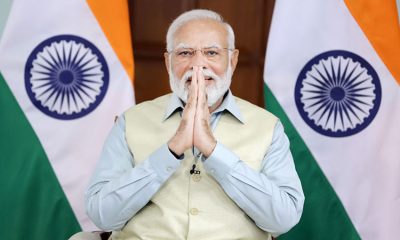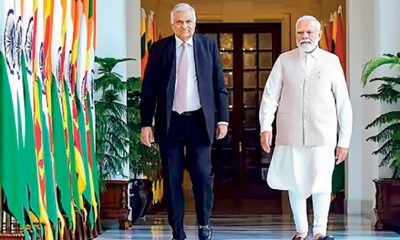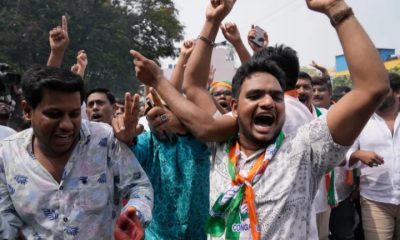Features
Warm Red Carpet for PM Modi in the US
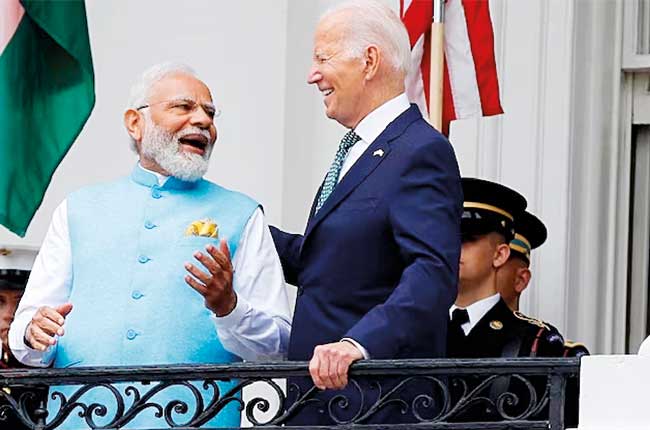
I am an Indophile and now a celebrant of India becoming the fifth highest economic nation in the world.  Thus naturally India is being courted by other nations, specifically of the West. Narendra Modi was damned for his inaction as Chief Minister of Gujarat, turning an official blind on the riotous massacre of Muslims in 2002, and refused entry to the US soon thereafter.
Thus naturally India is being courted by other nations, specifically of the West. Narendra Modi was damned for his inaction as Chief Minister of Gujarat, turning an official blind on the riotous massacre of Muslims in 2002, and refused entry to the US soon thereafter.
Now he is a keenly sought after ally and was recently given the most welcome state reception in Washington DC and an earnest listening to his speech in Congress. I draw your attention to Prof Amarasiri de Silva’s article titled PM Modi’s speech at US Congress – a lesson for Sri Lanka in The Island of June 29. It is perceptive and a must read.
I read Katie Roger’s detailing in the New York Times the state dinner given by Joe and Jill Biden in honour of the visiting PM of India, including 400 on the guest list. The article carried lots of pictures and described food served – mostly vegetarian; guests including Hunter Biden under a cloud, a couple of Republicans and family members, Democrats and supporters of the Party. Indians invited were Indra Nooyi, former CEO of Pepsi; Mukesh Ambani and Vimal Kapur, CEO of Honeywell.
The toast proposed by Biden to Modi and sipped by the two was non-alcoholic – ginger ale – it was said. In welcoming Modi, Biden boasted justifiably: “Two great nations, two great friends, and two great powers.” Later Modi pronounced his assessment of his host, maybe expressing the general opinion of the President of the United States: “You are soft spoken, but when it comes to action, you are very strong.”
Pictures showed true friendship between the two men; splendour of the venue; splendour of the state dinner; couture dresses of the women guests. To me the strongest impression that came across was the rise of India to such a height worldwide. With a population of 1.4 billion (one sixth of world population); poverty now being erased; and corruption greatly reduced; the commitment of Indians and loyalty to their country which they call Motherland, has elevated India so it is not very far behind the US and even China. Maybe ahead of Russia.
Success story
Narendra Modi has had an interesting, unconventional life. He may have been born and raised poor, but the story of his helping his father in a tea shop is not corroborated.
He was in an arranged marriage at age 18, but never lived with his wife Jashodaben Modi. In the early 2000s on entering the political fray, he left a blank in his first election application where civil status had to be entered. He publicly acknowledged his marriage four decades after marriage when legally required to do so. He abandoned his marriage and his home escaping to wander in the Himalayas, searching for spiritual meaning. It is well known that he was a devoted son to his aged mother.
He rose in a right wing Hindu organization and was a preacher. He became a full time worker for the RSS in Gujarat in 1971- the Rashtriya Swayamsevak Sangh, also known as the Sangh, which is an allegedly militant organization. After the state of emergency was declared by PM Indira Gandhi in 1975, he went into hiding. He entered politics and was Chief Minister of Gujarat from 2001 to 2014. Contesting the Varanasi seat he came to Parliament and became 14th PM of India in 2014.
In his speech to the American Congress recently he detailed the progress India has made and it surely is due in large measure to his vision, commitment and untiring efforts.
Singleness: a major plus in Indian politics
Along with the article in the NYT from which I got facts of the state dinner, I quote in this second part of my article Suhasini Raj in her write-up titled: Why Modi and other Indian leaders stay single.
A noticeable feature in the photographs and screen shots taken when Joe and Jill Biden, dressed in a green sequined long dress designed to resemble a worn sari waist up, was the Prime Minister of India climbing the steps of the White House very much alone. We learn that Narendra Modi wants it that way – emphasizing his singleness in photographs whether of his addressing an audience, appearing in the doorway of a plane, or at a function. The deliberately conveyed political message is: I am there for you. I will take care of things.
Modi (72, b September 17, 1950) lives by himself in the sprawling PM’s residence in New Delhi, his work seemingly the totality of his existence. He sleeps for only four hours. He has announced the fact that he lives for the nation and projects the image of him being proudly unattached, and thus proclaims that nothing comes between him, his time and the nation. “No other commitment can come in between my life and the nation. Every moment of my time, every pore of my body, is only for my countrymen” was what he said after winning elections in 2019. Also proclaimed is: “I have no familial ties.
Who would I try to benefit through corruption.” While in the West and most countries, family is important and projected, reading Suhasini Raj and observing the Indian scene, it becomes obvious that some of the most popular politicians with staying power are following Modi in not only being unmarried and unattached, but gaining political mileage from their singleness which is meant to equate to dedication and commitment to the nation. Examples are Mamata Bannerjee, Chief Minister of the State of West Bengal; Megawati of a scheduled caste, a powerful politician who holds meetings in her bedroom. Rahul Gandhi is a Congress Party example. Even Mahatma Gandhi is known to have sworn off all comforts and pleasures, even sex, as early as his 30s. The single politicians trade on the public’s assumption they sacrifice themselves for the good of the people. Gullible persons, in turn, look up to them as being spiritual and venerate them as gods and goddesses.
Comparison
As happens, I cannot but compare the ‘condition’ of our own politicians and those across the Palk Strait. India too was well known for corruption but it was reduced, even by volunteer vigilante investigators. The sharpest contrast is that not only are most of our politician leaders married and familied, some are widely whispered about as having extramarital liaisons!
Randiness appears to be a quirk among many males. Another is placing self before country, more so in honesty and financial matters. Indians in the majority are very country conscious and proud of being Indian. Sri Lanka at the very bottom of the prosperity, economic stability, happiness ladders should never be where it is now with being a small country, having a manageable population, very intelligent and literate in at least a native language and English.
But we are one of the poorest of the poor, having descended to this level in just three score years. It is not only our leaders and top bureaucrats who are to blame. We people are also responsible for our downfall; being lazy, wanting goods and services given free, harbouring short memories and much foolishness.
Will we ever rise up to being half of what we were when DS took over the governing reins? Spain that was so down and out is now economically stable, BBC reported. Just look across at Bangladesh.
Features
Ukraine crisis continuing to highlight worsening ‘Global Disorder’
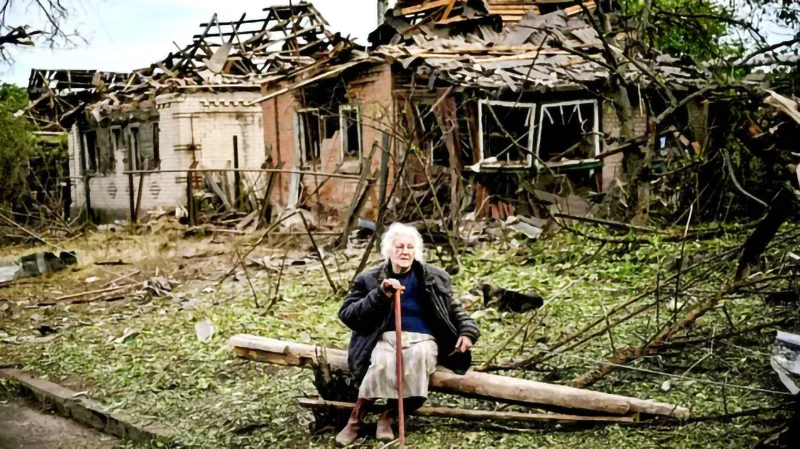
 The world has unhappily arrived at the 4th anniversary of the Russian invasion of Ukraine and as could be seen a resolution to the long-bleeding war is nowhere in sight. In fact the crisis has taken a turn for the worse with the Russian political leadership refusing to see the uselessness of its suicidal invasion and the principal power groupings of the West even more tenaciously standing opposed to the invasion.
The world has unhappily arrived at the 4th anniversary of the Russian invasion of Ukraine and as could be seen a resolution to the long-bleeding war is nowhere in sight. In fact the crisis has taken a turn for the worse with the Russian political leadership refusing to see the uselessness of its suicidal invasion and the principal power groupings of the West even more tenaciously standing opposed to the invasion.
One fatal consequence of the foregoing trends is relentlessly increasing ‘Global Disorder’ and the heightening possibility of a regional war of the kind that broke out in Europe in the late thirties at the height of Nazi dictator Adolph Hitler’s reckless territorial expansions. Needless to say, that regional war led to the Second World War. As a result, sections of world opinion could not be faulted for believing that another World War is very much at hand unless peace making comes to the fore.
Interestingly, the outbreak of the Second World War coincided with the collapsing of the League of Nations, which was seen as ineffective in the task of fostering and maintaining world law and order and peace. Needless to say, the ‘League’ was supplanted by the UN and the question on the lips of the informed is whether the fate of the ‘League’ would also befall the UN in view of its perceived inability to command any authority worldwide, particularly in the wake of the Ukraine blood-letting.
The latter poser ought to remind the world that its future is gravely at risk, provided there is a consensus among the powers that matter to end the Ukraine crisis by peaceful means. The question also ought to remind the world of the urgency of restoring to the UN system its authority and effectiveness. The spectre of another World War could not be completely warded off unless this challenge is faced and resolved by the world community consensually and peacefully.
It defies comprehension as to why the Russian political leadership insists on prolonging the invasion, particularly considering the prohibitive human costs it is incurring for Russia. There is no sign of Ukraine caving-in to Russian pressure on the battle field and allowing Russia to have its own way and one wonders whether Ukraine is going the way of Afghanistan for Russia. If so the invasion is an abject failure.
The Russian political leadership would do well to go for a negotiated settlement and thereby ensure peace for the Russian people, Ukraine and the rest of Europe. By drawing on the services of the UN for this purpose, Russian political leaders would be restoring to the UN its dignity and rightful position in the affairs of the world.
Russia, meanwhile, would also do well not to depend too much on the Trump administration to find a negotiated end to the crisis. This is in view of the proved unreliability of the Trump government and the noted tendency of President Trump to change his mind on questions of the first importance far too frequently. Against this backdrop the UN would prove the more reliable partner to work with.
While there is no sign of Russia backing down, there are clearly no indications that going forward Russia’s invasion would render its final aims easily attainable either. Both NATO and the EU, for example, are making it amply clear that they would be staunchly standing by Ukraine. That is, Ukraine would be consistently armed and provided for in every relevant respect by these Western formations. Given these organizations’ continuing power it is difficult to see Ukraine being abandoned in the foreseeable future.
Accordingly, the Ukraine war would continue to painfully grind on piling misery on the Ukraine and Russian people. There is clearly nothing in this war worth speaking of for the two peoples concerned and it will be an action of the profoundest humanity for the Russian political leadership to engage in peace talks with its adversaries.
It will be in order for all countries to back a peaceful solution to the Ukraine nightmare considering that a continued commitment to the UN Charter would be in their best interests. On the question of sovereignty alone Ukraine’s rights have been grossly violated by Russia and it is obligatory on the part of every state that cherishes its sovereignty to back Ukraine to the hilt.
Barring a few, most states of the West could be expected to be supportive of Ukraine but the global South presents some complexities which get in the way of it standing by the side of Ukraine without reservations. One factor is economic dependence on Russia and in these instances countries’ national interests could outweigh other considerations on the issue of deciding between Ukraine and Russia. Needless to say, there is no easy way out of such dilemmas.
However, democracies of the South would have no choice but to place principle above self interest and throw in their lot with Ukraine if they are not to escape the charge of duplicity, double talk and double think. The rest of the South, and we have numerous political identities among them, would do well to come together, consult closely and consider as to how they could collectively work towards a peaceful and fair solution in Ukraine.
More broadly, crises such as that in Ukraine, need to be seen by the international community as a challenge to its humanity, since the essential identity of the human being as a peacemaker is being put to the test in these prolonged and dehumanizing wars. Accordingly, what is at stake basically is humankind’s fundamental identity or the continuation of civilization. Put simply, the choice is between humanity and barbarity.
The ‘Swing States’ of the South, such as India, Indonesia, South Africa and to a lesser extent Brazil, are obliged to put their ‘ best foot forward’ in these undertakings of a potentially historic nature. While the humanistic character of their mission needs to be highlighted most, the economic and material costs of these wasting wars, which are felt far and wide, need to be constantly focused on as well.
It is a time to protect humanity and the essential principles of democracy. It is when confronted by the magnitude and scale of these tasks that the vital importance of the UN could come to be appreciated by human kind. This is primarily on account of the multi-dimensional operations of the UN. The latter would prove an ideal companion of the South if and when it plays the role of a true peace maker.
Features
JVP: From “Hammer and Sickle” to Social Democracy – Or not?
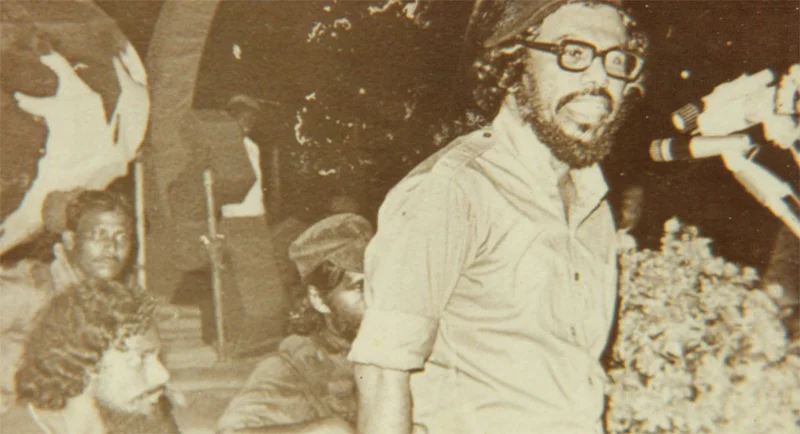
The National People’s Power (NPP), led by the Janatha Vimukthi Peramuna (JVP), came to power promising democratic renewal and long-awaited economic, educational, healthcare, and social transformation. It pledged to build a modern Sri Lanka rooted in democratic values while steering the country toward its vision of Democratic Socialism. For many supporters, the NPP’s rise to the pinnacle of political power represents a historic opportunity to reset the nation’s direction.
Yet recent developments have stirred unease. Statements by several senior ministers and certain policy signals have prompted critics to question whether the government’s path remains firmly democratic. Some warn that in the pursuit of rapid development and social justice, central pillars of the NPP’s election campaign, there may be a growing temptation to consolidate power in ways that edge toward policies of old “Hammer & Sickle.”
Is the NPP committed to pluralistic democratic socialism, or is Sri Lanka witnessing the early signs of a more centralised political model? To answer this question, it is necessary to revisit the JVP’s ideological history, examine the pressures that shape governing parties once in power, and weigh the potential consequences, both promising and perilous, of any shift in direction.
History of the JVP
The JVP emerged in the mid-1960s with a revolutionary agenda, mobilising youth through its Five Lecture Programme, which criticised capitalist policies, questioned the country’s “real independence,” opposed Indian influence, and called for armed struggle. This ideology culminated in the 1971-armed uprising against the elected government, leading to widespread violence, a harsh state crackdown, mass arrests, and the banning of the party.
Although suppressed, the JVP later re-entered democratic politics after its leaders were imprisoned and eventually pardoned. In the 1980s, after electoral defeat, the JVP shifted from strict Marxist-Leninist ideology toward a national, framework known as “Jathika Chinthanaya”, while maintaining strong opposition to Indian involvement.
However, it launched a second violent insurgency in 1988–1989, resulting in significant loss of life and severe repression, including the killing of its leader, Rohana Wijeweera. These events marked a decisive turning point, after which the party gradually moved away from armed struggle and embraced parliamentary politics.
By 1994, the JVP abandoned armed insurrection and embraced parliamentary democracy. While retaining its Marxist-Leninist identity, it adopted a more pragmatic socialist approach, seeking influence through elections rather than violence.
Embracing Parliamentary Democracy
The party served as Ministers and Deputy Ministers under President Chandrika Kumaratunga (2004–2005) and later supported Mahinda Rajapaksa in the 2005 presidential and subsequent parliamentary elections. Between 2005 and 2010, the JVP aligned with the Rajapaksa government in opposing federalism and supporting a unitary state.
Historically, the JVP opposed federalism. Under Anura Kumara Dissanayake (AKD), however, there appears to be a strategic shift toward decentralisation and inclusivity, without formally endorsing federalism. Since 2019, the NPP/JVP has criticised successive governments for failing to implement the 13th Amendment fully. This transformation is real and should be acknowledged.
Reports indicate the NPP/JVP is drafting a new constitution, but there is limited public clarity on its position regarding abolishing the Executive Presidency and devolving powers to Provincial Councils. Sri Lanka can chart a path toward a united, prosperous future where all citizens feel valued and represented. Therefore, I hope that NPP will consider the Provincial Councils in their current form might best serve as a relic of the past, making way for more cohesive and efficient systems of governance.
It is also a fact that many parties have historically criticised the Executive Presidency while in opposition, only to retain it in power. Whether the NPP/JVP will pursue genuine reform remains a subject of debate.
Democratic Concerns State Power
A recent statement by a senior Cabinet Minister that the party holds government power but has not yet “captured” broader state power raises fundamental questions. In a parliamentary democracy, winning government is the highest legitimate authority a party can obtain. Government power is temporary which is granted by voters, limited by the Constitution, and revocable at elections.
State power is permanent and it lies with state institutions i. e. the judiciary, administrative service, armed forces, law enforcement, and independent commissions. These bodies must remain politically neutral and serve the Constitution, to prevent any ruling party from dominating the permanent machinery of governance.
To frame democratic victory as incomplete without “capturing” state power, suggests a conception of power that goes beyond electoral legitimacy. It echoes a revolutionary mindset highlighting the real transformation requires ideological alignment of the state itself.
Past few decades, Sri Lanka has suffered from politicised institutions. Replacing one form of control with another is not reform, it is substitution.
Judiciary and Due Process
Public frustration over past corruption is understandable. However, allegations must be addressed through due legal process. In a democracy, individuals are innocent until proven guilty in a court of law. When parliamentarians publicly pass judgments on opposition figures before judicial proceedings conclude, it risks undermining the rule of law and raising concerns about political overreach.
Concerns are further heightened when there are perceptions that the rule of law is not applied equally, particularly if members of the governing party are treated differently in similar circumstances in the recent past. Unequal enforcement of legal standards can erode public trust in institutions. If such patterns persist, they may raise broader questions about the strength and impartiality of democratic governance.
Village-Level Courts
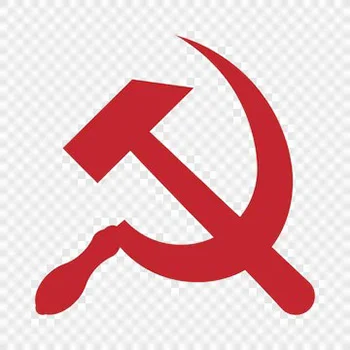
Democratic Concerns
State Power
In another recent statement, by a senior Minister reiterated one of his earlier proposals to establish judicial courts at the village level to adjudicate certain legal cases, depending on the nature and severity of the alleged offences. While improving local access to justice may enhance efficiency, such courts require strong institutional safeguards.
As this proposal raises serious concerns, it bears characteristics often associated with totalitarian systems, where village-level courts may be controlled by ruling party “cadres” who preside over legal matters and pass judgments against individuals. Without strong safeguards to ensure independence, transparency, and adherence to the rule of law, such courts could be misused to suppress dissent and curtail legitimate political opposition.
Any reform of the judicial system must uphold constitutional protections and preserve the separation of powers. Failing to do so could raise broader concerns about democratic accountability and institutional independence.
Civil / Administrative Service
Before 1978, Sri Lanka’s civil service was widely respected for its professionalism and independence. Over time, however, political appointments increasingly influenced senior administrative positions.
There are growing concerns that some recent appointments to high-level administrative service posts by the NPP may also be politically motivated. Many voters expected systemic reform and a decisive shift toward merit-based governance under the NPP/JVP. It is disappointing to observe indications that similar patterns of politicisation may be continuing.
The real test of reform lies not in rhetoric but in institutional safeguards. Transparent selection criteria, independent oversight mechanisms, and clear accountability structures are essential to ensuring that the administrative service remains professional and non-partisan.
History shows that democracy does not usually collapse overnight. It erodes gradually when ruling parties seek to align permanent institutions with their own ideological or political objectives.
Strengthening institutional independence is not optional, it is imperative. Sri Lanka’s democratic future depends not only on who holds power, but on how responsibly that power is exercised.
Media Freedom
“I disapprove of what you say, but I will defend to the death your right to say it”
(Evelyn Beatrice Hall, describing Voltaire’s belief in freedom of speech.)
Recent reports suggest the NPP/JVP government is dissatisfied with parts of the media, accusing some outlets of political bias and even proposing bans for allegedly spreading false information. Such actions would be undemocratic and would weaken constructive criticism.
Governments already possess legal remedies for defamation. If laws are inadequate, they may be reviewed. However, this must not undermine the media’s fundamental right to fair, independent, and legitimate criticism of those in power.
Every government dislikes criticism. But mature democracies tolerate it. Any attempt to restrict the media risks eroding democratic freedoms and should be adamantly opposed by all who value an independent media.
Religion and Public Conduct
In the past, opposition parties accused the JVP of being hostile to religion, particularly toward Buddhist monks aligned with political opponents. Confirming this accusation, recently a few NPP/JVP ministers, MPs, and party supporters have publicly criticised Buddhist monks who speak and organise meetings against the government.
At the same time, social media contains intolerable language about the conduct of certain Buddhist monks. While misconduct by members of the clergy is concerning, it does not justify hostile or disrespectful reactions from politicians or the public.
Responding with anger and division contradicts the very Dhamma many claim to defend. Using monks as political tools, or attacking them publicly, only deepens social divisions. If there are genuine concerns about the monastic order, they should be addressed respectfully through proper religious channels rather than through public humiliation.
Economic Democracy
Following Sri Lanka’s 2022 fiscal crisis, the NPP/JVP revised its economic policy and aligned itself with a framework closer to Social Democracy. This shift suggests that the JVP has accepted capitalism as the economic system necessary to revive the collapsed economy. At the same time, it has emphasised redistribution, welfare measures, and regulatory reforms aimed at reducing inequality.
The NPP/JVP’s economic policy now focuses on reforming capitalism rather than replacing it. The party initially sought to renegotiate the IMF agreement to ease the burden on the public. However, it was unable to secure significant changes. A key long-term objective remains reducing dependency on imports. The NPP aims to promote local industries and agriculture, while supporting small and medium-sized enterprises (SMEs) to reduce unemployment and expand export capacity.
Although the party pledged to strengthen state-owned enterprises through improved management rather than outright privatisation, recent developments indicate a shift toward public-private partnerships and selective privatisation.
Overall, economic progress is gradually aligning with these reformed Capitalist policies. This approach marks a significant departure from the original “Hammer and Sickle” ideology associated with classical Marxist theory as articulated by thinkers such as Karl Marx, Vladimir Lenin, and Friedrich Engels.
If judged solely on economic direction, the shift from revolutionary rhetoric to reformist governance appears substantial.
Bribery and Corruption
The nation is deeply grateful to the NPP government for taking bold steps to minimise bribery and corruption, which have long been a cancer eating away at our society. For decades, this practice has existed from top politicians to the lowest levels of the state sector, and even within society at large. Full credit must be given to the NPP government for prioritising the fight against this unethical and deeply rooted problem. It is hoped that the law will be applied equally to everyone, irrespective of status or party affiliation.
However, the public remains sceptical about the delay in pressing charges against the alleged culprits. During the election campaign, the JVP claimed that it possessed substantial evidence, over one hundred files, sufficient to prosecute members of previous governments accused of misusing public funds. Are they now discovering that the evidence is not as concrete as initially suggested?
Conclusion
Having analysed the current situation of the NPP/JVP, it is evident that there are conflicting statements from some senior figures in the JVP. Some favour the continuation of the traditional “Hammer and Sickle” policies. Others within the NPP emphasise and implement aspects of Social Democratic policies. Considering these differences, the nation is entitled to seek clarity regarding the government’s present direction.
It remains to be seen whether the JVP is merely marking time before reintroducing its former ideological policies, or whether it has genuinely chosen the path of Social Democracy.
By Gamini Jayaweera
Features
Valentine’s Day fundraiser … a huge success

In Melbourne, Australia, catering veteran Chris Cannon hosted the annual Valentine’s Day fundraiser at the Springvale RSL, with all proceeds being donated to the Home of Compassion in Sri Lanka, run by the Mother Teresa Sisters.
The Valentine’s Day fundraiser was held on 14 February and the event featured music by Shey and George (of Redemption fame) and DJ Jeremy Ekanayake.
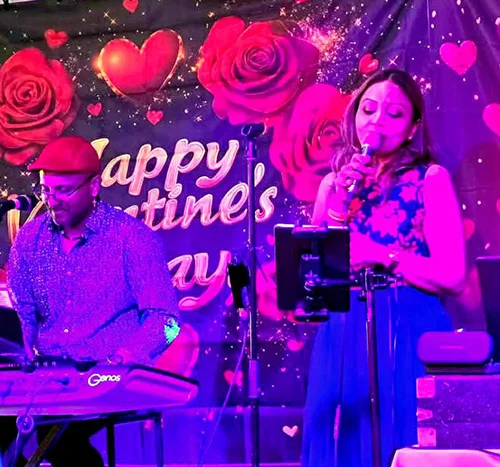
Shey and George providing the entertainment
The international buffet was a spread of Thai specialties and yummy Sri Lankan dishes and the large crowd present enjoyed the setup thoroughly, I’m told.
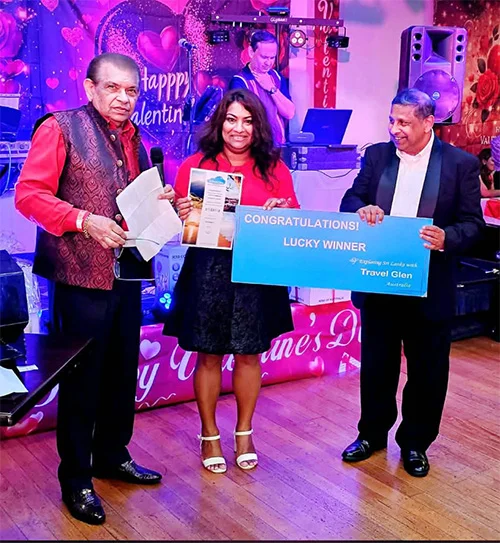
The lucky winner … trip to Sri Lanka
The Thai Street Food buffet was provided by Chris Cannon’s catering service, with his Thai wife, Annie, doing the needful.

The Cannon Team: Alice, Annie and Chris
His daughter, Alice, also played an active part in this fundraiser.
Chris, a Sri Lankan-born Melbourne resident, who has been hosting this annual event for several years, with all proceeds going to charity, attributes the success of this Valentine’s Day fundraiser to the team that worked tirelessly to make it a happening event.

Rose and a teddy for the ladies
“I’m ever so grateful to the Team that was responsible for the success of this fundraiser. They all worked with enthusiasm and the smiles on their faces, at the end of the event, said it all.”
It was a sell-out, with every lady receiving a rose and a teddy but, unfortunately, said Chris “we had to disappoint several who wanted tickets as it was a limited space venue.”
What’s more, there were also attractive prizes on offer, including a seven nights stay in Sri Lanka.
-

 Features5 days ago
Features5 days agoWhy does the state threaten Its people with yet another anti-terror law?
-

 Features5 days ago
Features5 days agoReconciliation, Mood of the Nation and the NPP Government
-

 Features5 days ago
Features5 days agoVictor Melder turns 90: Railwayman and bibliophile extraordinary
-

 Features4 days ago
Features4 days agoLOVEABLE BUT LETHAL: When four-legged stars remind us of a silent killer
-

 Features5 days ago
Features5 days agoVictor, the Friend of the Foreign Press
-

 Latest News6 days ago
Latest News6 days agoNew Zealand meet familiar opponents Pakistan at spin-friendly Premadasa
-

 Latest News6 days ago
Latest News6 days agoECB push back at Pakistan ‘shadow-ban’ reports ahead of Hundred auction
-

 Latest News6 days ago
Latest News6 days agoTariffs ruling is major blow to Trump’s second-term agenda






